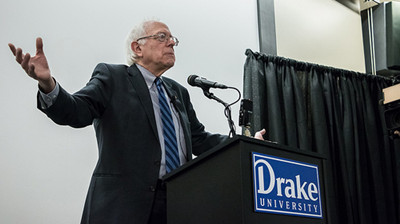Bernie Sanders Proposes Free Tuition, But Can It Work?
义务大学教育提案会生效吗?
You've probably already heard about Sen. Bernie Sanders' free-college tuition bill. It sounds like a great idea, right? Every student would have access to training to land them a career they'd love, without the burden of crushing student loan debt. Employers would have access to a more highly skilled pool of applicants. Eventually, even the economy as a whole could improve. So why isn't everyone on board?
你也许听说过Bernie Sanders关于免大学学费的提案,听起来挺不错的,是吧?这将使所有学生都能有机会通过教育来选择他们喜欢的职业,免去了沉重学生贷款的负担;老板们会遇到更多高等申请人;最终,也许整个美国的经济都会因此改变。那为什么并非所有人都支持这个提案呢?

1. From Whence Comes Moneybags?
省去的教育经费来自哪里?
The simple reality is that in order to just give away a free education, there must be a renewable source of funding. Sanders proposes to build his free-education scheme by taxing Wall Street. Ultimately, it would be a shared-cost plan, with shared federal and state responsibility.
最简单的现实是,为了提供大学义务教育,必须有足够的基金来源。Sanders提议利用收华尔街的税收来支持这个计划,最终,这将是一个共享计划,同时也拥有共享的联邦和州立义务。
2. Reinvent the Wheel
重建相关组织计划
There are already programs in place that are designed to help students attend college. With the Lottery Scholarship, put into place by the New Mexico State Legislature in 1996, more than 97,000 local students have attended public colleges and universities in New Mexico (only 38,000 graduated). So, we need to first look at what is working and find ways to replicate those programs for students across the U.S.
目前美国已经有一些帮助学生读大学的计划。比如1996年新墨西哥州立法机构颁布的彩票奖学金,已经使本地9万7千学生都有机会在本州公立学院和大学读书(虽然只有3万8千名学生毕业)。所以,我们需要先看看已有的相关机制,然后再考虑如何将这些福利拓展到全美的范围。
3. A Question of Survival
3.其他生活花费问题
When you say "free education," we also need to consider factors beyond tuition. While housing and food allowances are often available to low-income students, some of the most basic necessities of survival are still required.
提到“义务教育”,我们还需考虑下学费之外的因素。比如穷困生的食宿补贴,许多基本生活费都要考虑在内。
4. Prepare and Qualify?
4.享受福利的学生是否有足够的基础知识?
It's nice to say that we should just all go to college to gain the skills we need to succeed in our careers (and life). But, with the lack of very basic lack of skills in graduating high-school students, colleges are increasingly required to offer remedial skills. So, in a sense, we'd not really be offering "free college," but simply an extension of the overworked and under-resourced free public education system.
读大学对我们的职业生涯和生活的成功是有益的,但如果这些学生缺少初高中的基础知识,就更要求大学教授更多用来填补这些缺失的技能。所以,某种意义上,我们不是要提供“免费大学教育”,而只是提供了对现在过劳和资源紧张的免费公立教育一个延伸。
译文属可可英语原创,仅供学习和交流使用,未经许可,请勿转载。











